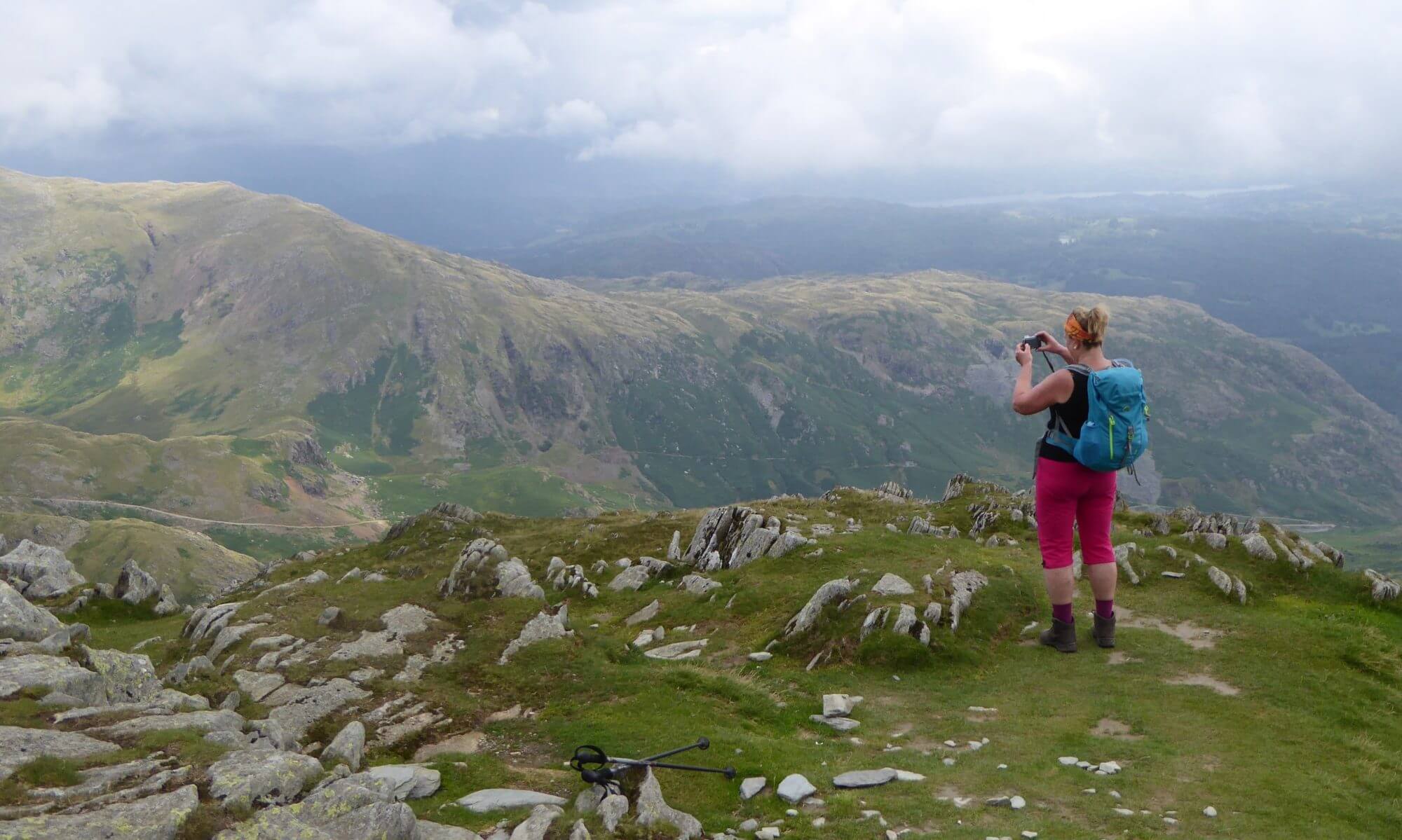It’s not easy to find a satisfactory, circular, morning walk in Siem Reap. I don’t like linear walks and I imagine this stems from my walking habits in the UK, where planning a circular walk is half the fun.
The roads around Siem Reap start off on tarmac but very soon give way to red dirt roads. 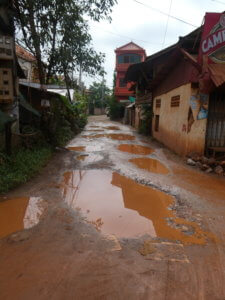 These aren’t a lot of fun in the dry season as passing vehicles raise a cloud of choking fine dust which covers everything in a red film. In the rainy season the roads soon turn to a sea of mud, treacherous and slippery for bikers and walkers alike. With the huge growth of construction traffic in the town, increasing numbers of big trucks are using these country roads and they are in a poor state.
These aren’t a lot of fun in the dry season as passing vehicles raise a cloud of choking fine dust which covers everything in a red film. In the rainy season the roads soon turn to a sea of mud, treacherous and slippery for bikers and walkers alike. With the huge growth of construction traffic in the town, increasing numbers of big trucks are using these country roads and they are in a poor state.
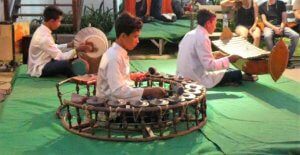
I set off around 6.30 am and the sounds are the first thing I notice – this morning there were two weddings warming up. The music, played on the roneat and the kong toch (the wooden xylophone and gong chimes respectively) give the music its characteristic tinkling sound which travels long distances over the flat landscape. On other mornings the more melancholy, repetitive chanting of monks advise of a death. Birdsong, even in this relatively suburban area is very varied with the calling of mynahs, screaming of palm swifts, singing of the oriental magpie robin and the chirruping of sparrows.

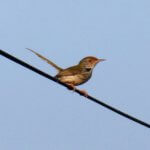
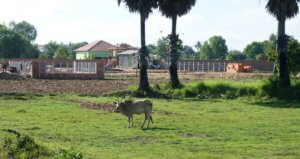
The countryside around the town reflects the huge changes taking place in the country. You can see an agricultural landscape slowly being eroded as parcels of land are sold for building and new houses and hotels spring up in the midst of market gardens, rice paddies and grazing. This is not surprising as the price of land is now 250 USD per m2 or 2.5 m USD per hectare in some areas of town. 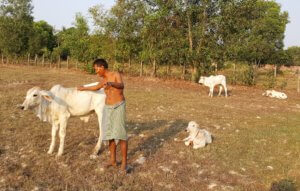 Dara is a local farmer and has 20 cows. I met him one morning and helped him to take the cows out to their field where they are staked out for the day. He has some new additions – calves that were born a week ago and he was keen for me to see them. We talked about his activity – he sells the cattle for meat in the local market and gets around 400 USD for them but the price is falling as imported Australian beef is having an effect on the price of homegrown beef. The fact that he can sell them at all surprised me as there appeared to be little meat on the animals I saw. He pays 400 USD a year for rent for this one field and borrows money from the bank to buy more stock. He rents another field and some land down at Tonle Sap where he grows rice. The price for rice is very low at 70 riels per kg (4,00 riels = 1 USD). Dara doesn’t do any other activity to bring in money and he is single as he says he cannot afford a wife!
Dara is a local farmer and has 20 cows. I met him one morning and helped him to take the cows out to their field where they are staked out for the day. He has some new additions – calves that were born a week ago and he was keen for me to see them. We talked about his activity – he sells the cattle for meat in the local market and gets around 400 USD for them but the price is falling as imported Australian beef is having an effect on the price of homegrown beef. The fact that he can sell them at all surprised me as there appeared to be little meat on the animals I saw. He pays 400 USD a year for rent for this one field and borrows money from the bank to buy more stock. He rents another field and some land down at Tonle Sap where he grows rice. The price for rice is very low at 70 riels per kg (4,00 riels = 1 USD). Dara doesn’t do any other activity to bring in money and he is single as he says he cannot afford a wife!
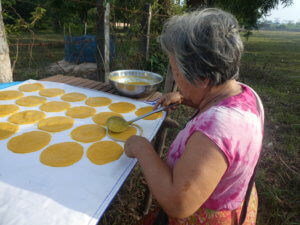
We are in peak mango season and you can easily get knocked out by the falling fruit! One morning I came across a lady making little mango patties to dry in the sun and this is a common thing to do with the abundant fruit. I wanted to try some but as the sun-dried product was not protected from flies probably a bit risky.
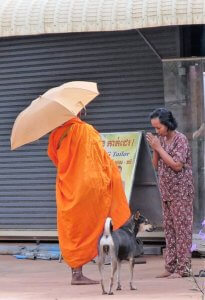 I am not alone doing an early morning walk as the Buddhist monks go around the houses and the shops collecting alms at this hour. They are given food and sometimes money and bestow a blessing on the giver. For the laity, giving is an essential part of the practice of Buddhism and a step on the path to Nirvana. I have been much taken by the colour co-ordinated umbrellas which serve both as sun-parasol and rain protector.
I am not alone doing an early morning walk as the Buddhist monks go around the houses and the shops collecting alms at this hour. They are given food and sometimes money and bestow a blessing on the giver. For the laity, giving is an essential part of the practice of Buddhism and a step on the path to Nirvana. I have been much taken by the colour co-ordinated umbrellas which serve both as sun-parasol and rain protector.
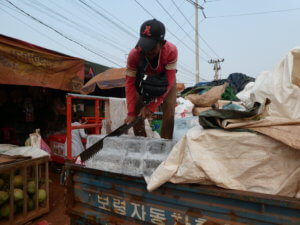
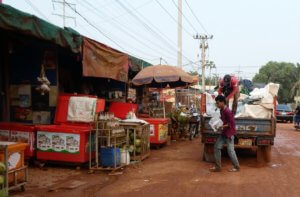
Everyone tells me that the electricity supply in town has improved but there are still daily cuts especially in the rainy season. The local cafes, restaurants and hotels don’t have deep freezes but depend on the early morning delivery of ice which is placed in bright orange chests. Trucks loaded with huge long blocks of ice go around all these little shops and cafes and slabs of ice are hewn off with a saw and sold by weight. Ice cubes are weighed out similarly and delivered by the sackload. I can’t help wondering what happens when the ice factory suffers a power cut?
I have seen all the little daily chores being carried out like doing the washing up at the tube well and the little kid having his hair washed, very unwillingly; the parents taking their motorbike-loads of kids to school and the ladies in floral pyjamas taking their vegetables to market; the many different types of mobile shop that tour around the sideroads, the ice cream man, the bread lady, the broom man and the cushion seller. Everyone has a cheery smile and waves hello at the foreigner who walks past their homes every day. Sussex will be a little different!
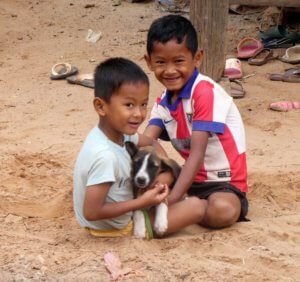
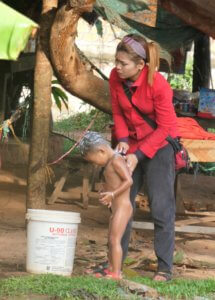
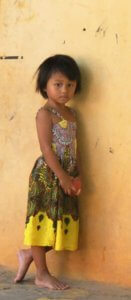
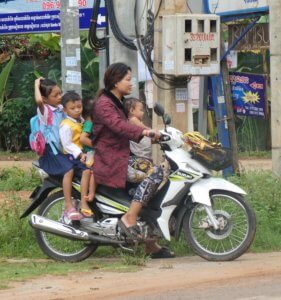
©Copyright overthehils.com 2018
